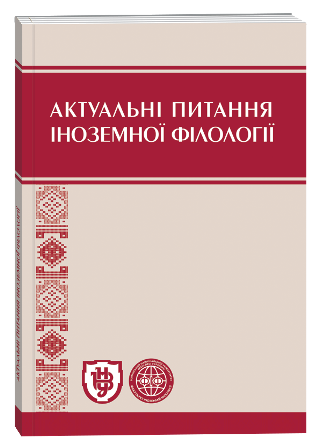СТИЛІСТИЧНІ ОСОБЛИВОСТІ НІМЕЦЬКОГО ПОЛІТИЧНОГО ДИСКУРСУ, ЩО ТЕМАТИЗУЄ РОСІЙСЬКУ ВІЙНУ В УКРАЇНІ (НА ПРИКЛАДІ ТОПОСУ ТИСКУ / DRUCK-TOPOS)
DOI:
https://doi.org/10.32782/2410-0927-2023-18-4Ключові слова:
аргументативні зразки, мисленнєві структури, топос, топос-аналіз, імпліцитні смислиАнотація
У статті досліджено лінгвостилістичні особливості політичного дискурсу, що тематизує російську війну в Україні. Аналіз здійснено на основі німецьких газет Frankfurter Allgemeine Zeitung, Berliner Zeitung, Tageszeitung, Neues Deutschland із початку повномасштабного вторгнення російського агресора 24 лютого 2022 року. Мета статті – на основі топос-аналізу німецькомовних мас-медіа відшукати мовні аргументативні зразки, що віддзеркалюють суспільну свідомість, цінності й погляди членів західноєвропейського суспільного простору з огляду на постачання зброї в Україну. Зважаючи на актуальні воєнні дії російського агресора проти України обрана тематика є обґрунтованою й цілком на часі. Новизна проведеного пошуку полягає у вивченні позиції німецьких політиків щодо постачання зброї в Україну. У роботі використано антропоцентричний підхід. На основі топос-аналізу визначено мовні аргументативні зразки (топоси), які характерні для воєнного дискурсу. Топос визначаємо як аргумент, загальнозначуще твердження або тему, що виводиться на основі синтаксичних конструкцій «Якщо...» та «Тому що...». Топоси аргументації виконують функцію легітимації певних позицій і є мисленнєвими структурами підходу до вирішення певного політичного питання. Типовими контекстно-специфічними топосами є топос небезпеки, топос тягаря, топос реальності та ін. На прикладі аналізу топосу тиску «Druck-Topos» показано зі сторони опозиції та інших парламентаріїв аргументовану критику політики нерішучості німецького уряду щодо постачання зброї в Україну. Для досягнення цієї мети політики послуговуються широким спектром стилістичних засобів. Показано позицію щодо постачання зброї в Україну окремих парламентаріїв з огляду на їхню партійну приналежність. Особливо емоційною є мова голови консервативної партії Німеччини (ХДС) Фрідріха Мерца та українського посла в Німеччині 2014–2022 рр. Андрія Мельника. Виявлено імпліцитні смисли текстового корпусу й показано домінантні способи мислення членів західноєвропейського політикуму з огляду на проблему протистояння російській агресії. Топоси як мисленнєві структури розкривають на основі текстових фрагментів ключові смисли концепту «Waffenlieferung». У певному географічному та часовому просторі домінують ті або інші аргументативні зразки. Цей процес мислення є віддзеркаленням історичного минулого.
Посилання
Бондарчук О. Ю. Особливості топос-аналізу. Актуальні питання іноземної філології: наук. журн. № 2. Луцьк, 2015. С. 27–30.
Лисецька Н. Г. Топос-аналіз концепту «Flüchtlinge» в сучасному німецькомовному дискурсі. Актуальні питання іноземної філології: наук. журн. / (редкол.: І. П. Біскуб (голов. ред.) та ін.). № 8. Луцьк, 2018. С. 191–197.
Лисецька Н. Г. Стилістичні засоби вираження концепту «Europa» у сучасній німецькомовній пресі. Modern science: innovations and prospects. Proceedings of the 1st International scientific and practical conference. SSPG Publish. Stockholm, Sweden. 2021, Pp. 414–417. URL: https://sci-conf.com.ua/i-mezhdunarodnaya-nauchno-prakticheskaya-konferentsiya-modern-science-innovations-and-prospects-10-12-oktyabrya-2021-goda-stokgolm-shvetsiya-arhiv/
Тараненко О. Долання евфемізації в «мові війни» українського медійного та політичного дискурсу. Вісник Національного університету «Львівська політехніка». Серія: Журналістські науки: збірник наукових праць / МОН України. № 883. Львів: Вид-во Львівської політехніки, 2017. С. 139–144.
Girnth H. Sprache und Sprachverwendung in der Politik. In: T. Gloning, J. Kilian (Hg.): Germanistische Arbeitshefte. Band 39. Berlin; Boston: Walter de Gruyter GmbH, 2015. 180 S.
Kienpointner M. Topoi. In: E. Felder und A. Gardt (Hg.): Handbücher Sprachwissen. HSW 19. In: K. S. Roth, M. Wengeler und A Ziem. (Hg.): Handbuch Sprache in Politik und Gesellschaft. Berlin; Boston: Walter de Gruyter GmbH, 2017. S. 187–211.
Niehr T. Einführung in die Politolinguistik. Vandenhoeck & Ruprecht. 2014. 191 S.
Niehr T. Argumentation in Texten. In: E. Felder und A. Gardt (Hg.): Handbücher Sprachwissen. HSW 19. In: K. S. Roth, M. Wengeler und A Ziem. (Hg.): Handbuch Sprache in Politik und Gesellschaft. Berlin; Boston: Walter de Gruyter GmbH, 2017. S. 165–186.
Spieß C. Metaphern. In: E. Felder und A. Gardt (Hg.): Handbücher Sprachwissen. HSW 19. In: K. S. Roth, M. Wengeler und A Ziem. (Hg.): Handbuch Sprache in Politik und Gesellschaft. Berlin; Boston: Walter de Gruyter GmbH, 2017. S. 94–115.
Wengeler M. Topos und Diskurs – Möglichkeiten und Grenzen der topologischen Analyse gesellschaftlicher Debatten. In Diskurslinguistik nach Foucault: Theorie und Gegenstände, edited by Ingo H. Warnke. Berlin; Boston: De Gruyter, 2007. S. 165–86. URL: https://doi.org/10.1515/9783110920390.165







